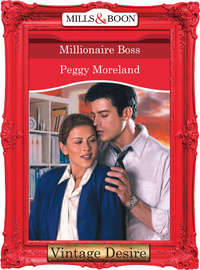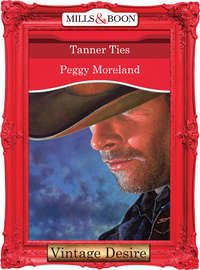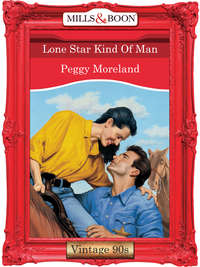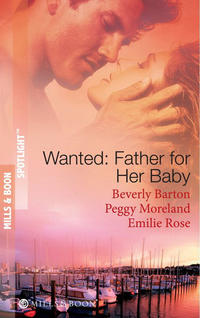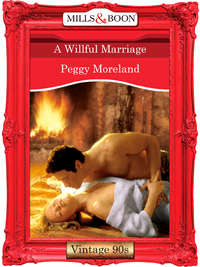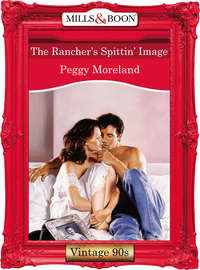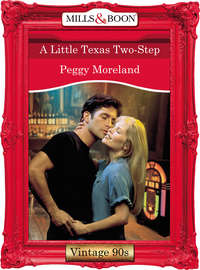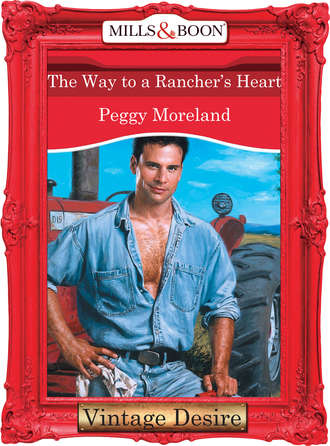
Полная версия
The Way To A Rancher's Heart
“Trouble?” When he didn’t offer an explanation, she stopped in front of him, folding her arms beneath her breasts and arching a brow, stubbornly refusing to enter until he had clarified that last comment. His gaze dropped to her chest and breasts that strained against her tank top’s fabric. She bit back a smile as a blush rose to stain his cheeks.
“Trouble,” he repeated, emphasizing the single word, as if it alone explained everything, then gave her a nudge with his shoulder, urging her through the door ahead of him.
“Okay,” she said and crossed to the sink to wash her hands. “Granted I’m younger than you. Even I can see that. But what’s wrong with a young woman, and why do you consider one trouble?”
“Woman?” He snorted at her choice of word. “I said girl. I would hardly classify you as a woman.”
She snagged a dish towel from the hook above the sink and dried her hands as she turned to peer at him. “And what does a girl have to do,” she asked, placing emphasis on the word as he had, “in your opinion, before she is classified as a woman?”
He elbowed her aside and hit the faucet’s handle, then stuck his hands beneath the water. “Live. Get some years on her. Some experience.”
Enjoying the conversation, but unsure why when she knew she should be insulted by his chauvinistic attitude, she rested a hip against the counter and watched as he scrubbed his hands. “And what do you consider experience?”
He scowled and hit the handle with his wrist, shutting off the water. He stood, dripping water into the sink, and Annie pushed the towel into his hands. He shot her a look, his scowl deepening. “Live,” he repeated. “Life offers its own form of experience.”
She angled her body, watching as he crossed to the refrigerator. “Oh, really?” she posed dryly.
“Yeah, really,” he muttered, his reply muffled by the interior of the refrigerator. He pulled a gallon jug of milk from inside, closed the door, then lifted the jug, drinking directly from the container.
Clucking her tongue at his lack of manners, Annie pulled a glass from the cupboard, crossed to him and snatched the milk jug from his hand.
Scowling, he wiped the back of his hand across his mouth, removing a white moustache. “What did you do that for? I’m thirsty.”
She filled the glass and handed it back to him. “Unsanitary,” she informed him prudently and opened the door to replace the jug of milk. “And a bad example for the children. Now I know where Clay picked up the habit.” She pulled out a bowl and crossed to the table. “I hope you like pasta, because that’s what I made for lunch.”
Still frowning, he followed her to the table and sat down in his chair at the head of it, eyeing the bowl’s contents with distrust. “What’s in it?”
“Pasta curls, grilled vegetables, some herbs, a little olive oil and balsamic vinegar.”
He reared back, curling his nose and eyeing the bowl warily. “I’m a meat and potatoes man, myself.”
“Really?” she asked, nonplused, and sat down in the chair at his right. “I’d think after working around those smelly old calves all morning that you’d have lost your taste for beef.”
He jerked his head up to glare at her. “I’ll have you know those smelly old calves help pay the bills around here.”
She lifted a shoulder and spooned a generous serving of pasta onto his plate. “If you don’t eat the merchandise, then that just means more profit, right?”
His thick brows drew together over his nose. “What the hell kind of thinking is that?”
She lifted a shoulder as she served her own plate. “Rational. The less you eat, the more beef you have to sell.” She lifted her shoulder again as she set the bowl back on the table. “Makes sense to me.”
He huffed a breath and picked up his fork, shaking his head. “Yeah. I guess to a girl like you, that would make sense.”
Heaving a long-suffering sigh, she turned to look at him. “Are we back to that topic again?”
He scooped up a forkful of pasta and shoveled it into his mouth. “Yeah, I guess we are.”
Stretching across the table for the breadbasket, she tore off a section of the still-warm loaf and dropped it onto his plate before tearing off a piece for herself. “If that’s all you can think to talk about, your conversational skills are lacking. You really should work on that.”
“Nothing wrong with my conversational skills,” he informed her and lifted his fork for another bite. ‘You’re just pissed because I called you a girl.”
She shook her head and sank back in her chair, watching him wolf down the pasta. And he’d said he was a meat and potatoes man, she thought, biting back a smile. “I’m not insulted because you referred to me as a girl. I am a girl. A female. And proud of it. But I am a bit surprised that you’d make an assumption on my level of experience, based on your definition of the term,” she added pointedly, “considering you know absolutely nothing about me.”
He cocked his head to peer at her, then waved his fork in her direction before returning his attention to his meal. “Okay. I’ll bite. Tell me about yourself.”
She reached for her glass of water and took a sip, then propped her elbows on the table, cradling the glass between her hands. “I’m a graduate of the University of Texas where I majored in art and minored in secondary education. I obtained my master’s degree in December.”
He lifted an eyebrow, obviously impressed. “A college graduate, huh? So what’s a woman with that much education doing working as a housekeeper and nanny?”
It was her turn to lift an indifferent shoulder. “I like to eat. When you graduate in December, teaching jobs are a little hard to come by.”
“You plan to teach?”
“Yes, and I hope to do some freelancing on the side.”
“What kind of freelancing?”
“Photography. I plan to supplement my income by selling photos, and possibly accompanying articles, to magazines and journals.”
“Sounds like you’ve got your future all planned out nice and tidy.”
“Yes,” she agreed, but was unable to resist the urge to dig at him a little. “So does that make me mature, more experienced? By your definition, a woman, rather than a girl?”
He snorted and laid down his fork, then reared back in his chair and leveled his gaze on her. “Experience comes with knocks. The hard kind. That’s where I got my degree. The school of hard knocks.”
“And what kind of knocks have you had in your life?”
His gray eyes, once intent upon hers and filled with something akin to humor, took on a hooded look, as if a black cloud had swept across them, hiding his emotions. He rose and carried his glass to the sink to rinse it out and refill it with water, then stood, staring out the window.
“My parents died in a car wreck when I was nineteen,” he said after a moment, his voice roughened by the memories. “I was a freshman at Texas A&M. Had to come home and take over the ranch. My sister, Penny, was thirteen. The courts appointed me her legal guardian.” He stood a moment longer, staring out the window, then angled his head to narrow an eye at her. “My wife died two years ago. Brain aneurysm. Gone like that,” he said, with a snap of his fingers. “Without any warning. Left me with three kids under the age of eleven to raise on my own.”
“You had Penny,” she reminded him, fighting back the swell of sympathy that rose.
Scowling, he turned to face the window again. “Had being the operative word.”
“You still have her,” she insisted. “Just because she chose to pursue her own life doesn’t mean that she’s extracted herself permanently from yours.”
He shot her a glare over his shoulder. “Sure you didn’t get that degree in psychology?”
She shook her head. “No. Art. But I’m a people watcher. It’s a hobby of mine. And do you know what I see when I look at you?”
“What?” he asked drolly.
“A man who feels sorry for himself.”
He slammed the glass down on the counter so hard that water shot above the lip like a geyser. He spun to face her, his face flushed with anger. “I don’t feel sorry for myself. I’ve taken the cards I’ve been dealt and played them as best I could. Nobody can question that. Least of all you.”
She rose and crossed to him. “Maybe I don’t have the right, but I do think I’m correct in assuming you feel sorry for yourself. And now you’re blaming your sister for leaving you to take care of your children alone.”
He grabbed her by the shoulders, his eyes boring into hers as he glowered down at her. “You listen to me little girl,” he grated out through clenched teeth. “I don’t blame Penny for anything, other than taking off without giving me any warning.”
Undaunted by his anger, by the dig of his fingers into her flesh, she met his gaze squarely, maybe a bit stubbornly. “She warned you she was leaving. You told me so yourself just this morning.”
He continued to glower at her, a muscle ticking on his jaw, then he released her, pushing her away from him as he turned back to face the window. “I didn’t believe her. She’d said before she was going to leave, but she never went through with it.”
“And you’re angry with her because this time she did what she said she was going to do.”
He whirled to face her, his gray eyes hard as steel. “The kids need her. They depend upon her. And she walked out on them.”
“They need you,” she argued. “Their father.”
He thrust his face close to hers. “And what makes you an authority on what a kid needs? Huh? What the hell makes you think you know better than I do what my own kids need?”
She drew in a long breath, never once moving her gaze from his. “Because I was a kid once myself. My father died of a heart attack when I was five. My mother never got over the loss. She committed suicide when I was six. I needed my father,” she said, and blinked back the unexpected tears that rose. “And I needed my mother, too. But she wimped out. Left me all alone.” She hitched a breath but refused to let the tears fall. “That’s how I know,” she said, her voice growing as steely as the eyes that met hers. “You want to talk about hard knocks?” She tapped a finger against his chest. “Mister, I’ll compare lumps with you any day of the week.”
Two
Annie experienced a brief stab of remorse for the sharp words she’d exchanged with her employer…but, thankfully, it didn’t last long. She dispensed with it by assuring herself that he’d deserved the tongue-lashing she’d given him.
Calling her a girl, she reflected irritably as she stripped the sheets from the children’s beds. And carrying on as if he were the only person in the world who had suffered any losses. Well, she had suffered her share of losses, too. But she had dealt with her losses, accepting them as natural occurrences in life, situations totally out of her control, and had gone on living, which was more than she could say for Jase Rawley. Instead of dealing with his grief, it appeared he had dug himself a hole and climbed inside where he continued to lick his wounds, shutting out his children and anyone else who tried to get too close.
But his children needed him, she thought, feeling the frustration returning. Couldn’t he see that? She certainly could and she’d only been living in his home for a week. Well, he was going to have to climb out of that hole, she told herself as she stuffed the linens into the washing machine. Even if it meant her throwing a stick of dynamite into the hole he’d dug for himself and blasting him out.
Pleased with the image that thought drew, Annie started the first load of laundry, then went to the master bedroom to remove the sheets from Jase’s bed. Though she’d been in his room several times during the week, she hadn’t entered her employer’s private quarters since his late-night return. She noticed immediately the changes his presence made in the room. The sharp, spicy scent of aftershave lingered in the air, as did the faint odor she’d learned to associate with the corral and the livestock herded in and out of it almost daily.
She stooped to pick up a pair of socks from the floor and held her nose, grimacing, as she deposited them in the hamper in the master bath where she noticed more signs of her employer’s presence. A wet towel lay on the floor, discarded after his morning shower, she was sure. A toothbrush was angled over the edge of the sink and an assortment of coins were scattered over the tile countertop where he’d obviously emptied his pockets before dropping the jeans to the floor. She nudged a fingertip through the pile of loose change, finding a rusty nail and a crumpled receipt amongst the coins, as well as a tattered package of antacids.
Shaking her head at the odd accumulation, she picked up the jeans and dropped them in the clothes hamper before returning to the bedroom. She frowned slightly as she noticed that the bed, though rumpled, was already made. Had he made it up himself? she wondered, then snorted a laugh when she noticed the imprint of his body on the comforter and realized that he hadn’t even bothered to turn down the bed when he’d arrived home, but had opted to sleep on top of the covers instead.
With a rueful shake of her head, she ripped back the comforter and quickly stripped off the sheets. Wadding them into her arms, she headed for the laundry room, but slowed in the hallway, her attention captured by the gallery of framed pictures hanging there. Though she’d looked at the photos before, she found her curiosity heightened after her earlier, heated conversation with her employer.
Pictures of Rachel and the twins dominated the wall, monitoring the children’s growth from birth to present day, but Annie found herself skimming over them in search of pictures of Jase. She smiled as she recognized a picture of him with Penny, taken when his sister was probably about Tara’s age. Jase stood apart from Penny, yet there was an unmistakable protectiveness in his posture that indicated he took his responsibilities as his sister’s guardian very seriously.
Though he was much younger in the picture, Annie noticed that Jase hadn’t changed much over the years. In fact, she was sure she recognized the grim scowl and the steely-eyed impatience as the same expression he’d graced her with at breakfast and again at noon.
With a sigh, she shifted her gaze to Penny. Plain, but by no means unattractive, in the photograph Penny projected an image of solemnity unnatural for one so young. Annie supposed it was due to the tragedies Penny had suffered so early in life, the responsibilities she’d been forced to assume.
Though she’d only known Jase’s sister a short span of time, Annie suspected she knew Penny better than her own brother did. She attributed that advantage to her fondness for studying people, noting their mannerisms and habits, the little quirks that spoke volumes about their personalities. Too, people tended to tell her things about themselves, guarded little secrets that they wouldn’t dream of sharing with another. She wasn’t sure why that was so, though she suspected it was simply because she was willing to listen. For whatever reason, throughout her life she had found herself serving as a sounding board and vault for the problems and dreams of countless others, just as she had for Penny in the short week they had spent together before Penny’s departure.
Penny Rawley was way past spreading her wings a little, Annie reaffirmed as she moved farther down the hallway. From what Penny had told her, the woman had dedicated herself and her life to Jase and his family. Especially so after the death of Jase’s wife.
Reaching a wedding portrait framed in gilt, Annie stopped in front of it, tilting her head slightly as she studied the couple pictured there. So young, she thought with a twinge of sadness as she focused on the bride smiling radiantly and lovingly up at her husband, a bouquet of white roses clutched beneath her chin. And what a scar her passing had left on Jase, she reflected with regret, noting the devotion with which he gazed down upon his wife and remembering the bitterness of his expression when he’d snapped his fingers, demonstrating the quickness of her passing. That he’d loved his wife was obvious in the gesture. That he still harbored resentment, maybe even anger over her loss was even more obvious.
Pensive, she moved on to the laundry room, stuffed the dirty linens into the washing machine, then headed outside with a basket loaded with those she’d already washed. The warmth of the sun and the sound of birds singing in the centuries-old oak tree at the corner of the backyard chased her concerns for Jase and his family from her mind and drew a cheerful smile. Humming an accompaniment to the birds’ warbled songs she drew a sheet from the basket, caught it by its corners and clipped it to the clothesline, then reached inside the basket for another.
“We have a clothes dryer.”
Annie jumped, then sagged weakly, clutching the damp sheet against her chest as she turned to frown at Jase. “You’ve got to quit doing that,” she scolded.
“Doing what?”
“Sneaking up on me like that.”
He lifted a shoulder. “Wasn’t sneaking. Was on my way to the house.” He gestured to the sheet she still held against her chest. “Thought I ought to let you know we have a clothes dryer and save you the trouble of hanging the sheets on the line.”
She huffed a breath as she turned. “I know there’s a clothes dryer,” she replied, thinking of the mountains of dirty laundry she’d washed since her arrival in his home. She plucked a clothespin from the line and clipped it over the sheet, securing it in place. “I just happen to prefer sun-dried linens.”
He lifted an indifferent shoulder. “It’s your back.”
“Yes, it is,” she agreed and squatted down beside the basket to dig through the remaining linens for the matching pillowcases to hang. “And speaking of my back, would you mind if I strained it a little more by cleaning out the garden and planting a few vegetables?”
When he didn’t respond immediately, she glanced up and found that he’d turned and was staring at the garden plot, his eyes narrowed, his jaw set in a hard line. Seeing the slow bob of his Adam’s apple, she quickly rose. “If you’d rather I didn’t—”
He shook his head and walked away. “Do what you want with it,” he muttered.
She stared after him, wondering what it was about her request that he found so upsetting.
Still puzzling over Jase’s strange reaction to her request to plant a garden, Annie whacked at the weeds choking the small piece of ground. She’d cleared a space about three feet by three feet when the hairs on the back of her neck prickled. Sensing that she was being watched, she glanced up and saw Jase standing in the opening of the barn’s loft, shirtless, his hands braced high on the opening’s frame. Sweat gleamed on his muscled arms and chest and darkened the waist of his jeans.
Though his hat shadowed his face, she felt the intensity of his gaze, the unmistakable heat in it. As he continued to stare, she drew a hand to the hollow of her throat, suddenly feeling exposed, as if he’d somehow managed to strip her of her clothing and left her standing naked in the garden.
An awareness passed between them, something primitive and sexual that had Annie’s pulse pummeling her palm, her mouth going dry as dust. She wanted to look away…but found she couldn’t. She could only stare in slack-jawed fascination at the virile image he created standing high in the loft, one knee slightly bent, one hip cocked a little higher than the other. He looked so commanding, so utterly masculine, so bone-meltingly sexual. And when he dropped a hand to rub it lazily across the dark, damp hair on his chest, she closed her eyes, suddenly feeling weak, sure that she could feel the damp heat on her lips, taste on her tongue the salt from his skin.
Anxious for another look, she opened her eyes, but he was already turning away. Stifling the moan of disappointment that rose, the sense of loss, she slowly caught up the hoe and began to chop half-heartedly at the weeds again, her movements sluggish now, her strength drained by the attraction that churned low in her belly.
Her thoughts were so scattered, her senses so dulled, it took a moment for her to become aware of the rumble of the school bus. Straightening, she drew the hoe up, propped her hands on its handle and inhaled a deep, steadying breath, pushing back her lustful thoughts of Jase as she watched the bus near.
It stopped in front of the house and the door folded back. Rachel, always seated at the front of the bus, came tumbling down the steps, dragging her book bag behind her, and headed straight for the house.
“Hey, Rachel!” she called, lifting a hand in greeting. “Over here. How was school?”
A grin spreading from ear to ear, Rachel raced toward the garden, waving a paper above her head. “Annie! Look! I made a hundred on my spelling test!”
“Why, that’s wonderful, sweetheart!” Annie stepped from the garden and leaned the hoe against the low fence, then knelt and wrapped an arm around the girl’s waist, drawing her to her side. “And look,” she said pointing, “your teacher gave you a gold star, too.”
“That’s ’cause my penmanship was so good.”
“And it is,” Annie agreed, hugging the girl to her.
“What’s for dinner?”
Annie glanced up at the question and saw Tara headed her way, followed closely by Clay. She widened her smile to include the twins. “Dinner isn’t for a couple of hours, yet, but there are fresh vegetables in the refrigerator and some dip, if you’d like a snack.”
Tara rolled her eyes and did a neat U-turn, heading for the house. “Rabbit food,” she muttered under her breath.
Surprised by the teenager’s sour expression, Annie rose, staring after her.
“Ignore her,” Clay said. “She’s in one of her moods.”
“It certainly appears that way,” Annie replied, wondering if the mood was a carryover from the teenager’s brief but heated confrontation with her father that morning. “And how was your day?” she asked, turning to smile at Clay.
“Okay.”
“Kiss any girls?” she teased.
He ducked his head, blushing, and chipped the toe of a boot against the ground. “Nah.”
Annie laughed. “Well, there’s always tomorrow.”
He glanced up at her, then quickly away, his blush deepening, then shifted his gaze to the garden. “What are you doing out here?”
“Getting the soil ready to plant.” She glanced at the garden and sighed wearily, disappointed by the small amount of progress she’d made. “But it’s turning out to be a much bigger chore than I anticipated.”
“Does Dad know you’re working in here?”
“Well, yes,” Annie replied, puzzled by his question. “Why do you ask?”
He shrugged and hitched his backpack higher on his shoulder. “No reason. It’s just that…well, nobody’s planted a garden since Mom died.”
“Oh,” she murmured, understanding now why Jase had seemed so upset when she’d asked his permission to plant a garden. “I didn’t know.”
Clay shrugged again. “No big deal. It’s just dirt.”
Annie stared at the weed-clogged clods she’d managed to overturn, suspecting that, though the garden might be nothing more than dirt to Clay, it represented a great deal more to the boy’s father.
Feeling the guilt nudging at her for the painful memories her request must have drawn for Jase, she shrugged it off and forced a smile as she turned to Clay. “Are you hungry?”
He reared back and patted his stomach, grinning. “Starving.”
Annie caught Rachel’s hand, then slung an arm over Clay’s shoulders, heading both children toward the house. “How about some rabbit food?” she teased.
“Just call me Thumper,” he replied, grinning.
“Clay!”
Clay spun, his grin fading when he saw his father standing in the barn’s doorway, scowling, his arms folded across his chest. “Yeah, Dad?” he called.
“You’ve got chores waiting.”
“But couldn’t I eat something first?”
When his father merely angled his head and arched a brow in warning, Clay heaved a sigh. “Yes, sir,” he mumbled, then turned to Annie. “Sorry. Guess I’ll have to grab something later.”


